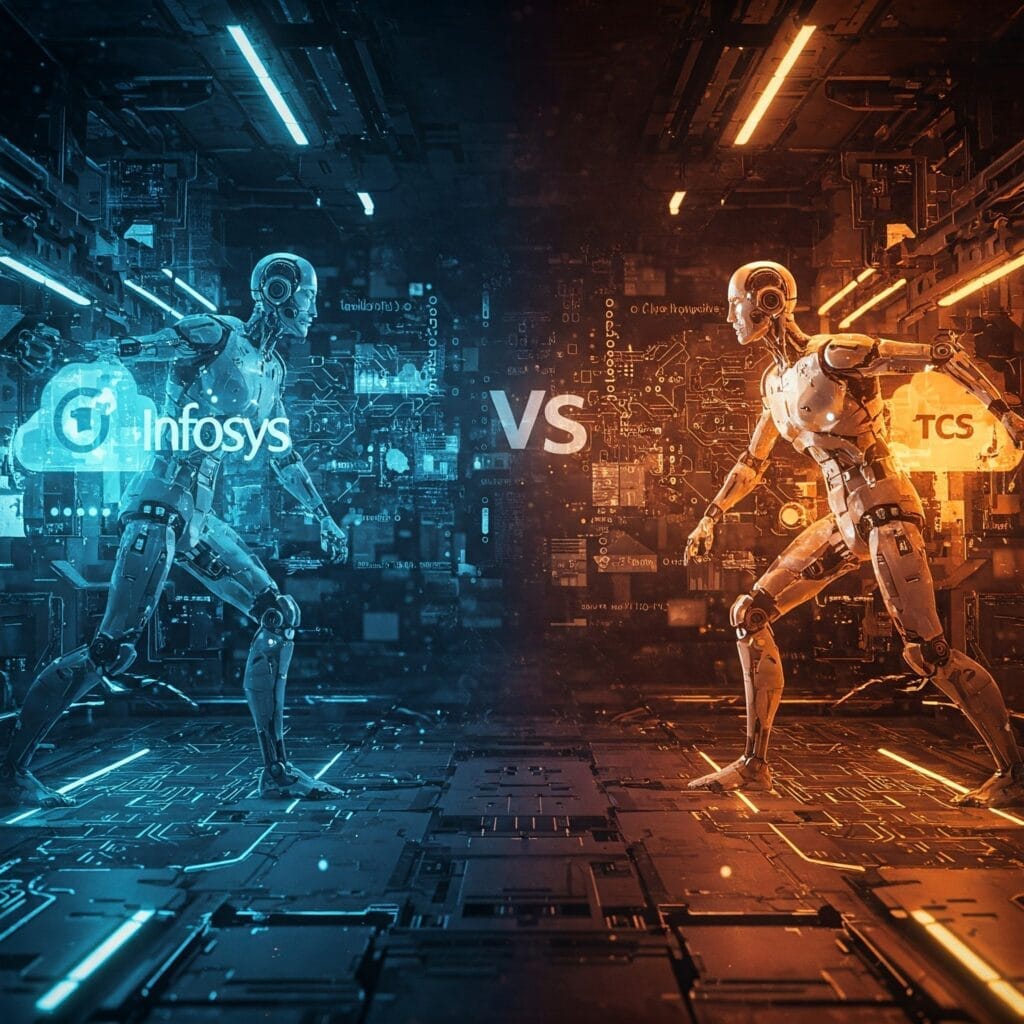Infosys vs. TCS: Who Leads India’s IT Revolution?
Explore the head-to-head battle of Infosys vs. TCS in India’s IT revolution. Discover expert insights, detailed case studies, and actionable tips – dive in now!

Table of Contents
• Introduction to Infosys vs. TCS
◦ The Battle Begins
◦ India’s IT Revolution Unfolds
• Company Overviews and Histories
◦ Infosys at a Glance
◦ TCS: A Global Powerhouse
• Financial Performance and Market Leadership
◦ Revenue Growth and Profitability
◦ Market Share Analysis & Comparison Table
• Technological Innovations and Digital Transformation
◦ Pioneering Digital Solutions
◦ Investment in R&D and Future Tech
• Work Culture, Talent, and Global Impact
◦ Employee Empowerment and Diversity
◦ Real-World Case Study: Transforming a Retail Giant
• Strategies for Global Expansion and Client Acquisition
◦ Strategic Partnerships and Acquisitions
◦ Actionable Tips for IT Industry Success
• The Future of India’s IT Revolution
◦ Emerging Trends and Predictions
◦ Key Takeaways Summary Box
• Frequently Asked Questions (People Also Ask)
Introduction to Infosys vs. TCS
In the bustling corridors of India’s IT revolution, few comparisons spark as much debate as Infosys vs. TCS. In the very first paragraphs, you’ll notice that Infosys vs. TCS isn’t just a catchphrase – it’s a lens into how two industry giants are shaping the digital landscape. Whether you’re searching for “Infosys vs. TCS revenue comparison” or wondering, “Which company is better: Infosys or TCS?”, this discussion is designed to guide you through the nuances of India’s IT evolution.
The Battle Begins
Imagine a scenario where two titans, each with a legacy of innovation and market dominance, face off in a head-to-head contest. That’s exactly the narrative behind Infosys vs. TCS. Both companies have carved out unique identities, and their competition drives continuous improvements that benefit global clients.
India’s IT Revolution Unfolds
From groundbreaking digital transformations to record-breaking fiscal quarters, the story of Infosys vs. TCS is interwoven with India’s broader IT revolution. Early on, both firms positioned themselves to leverage emerging technologies, and today, their strategic decisions continue to set industry benchmarks.
Company Overviews and Histories
Understanding Infosys vs. TCS starts with a look at each company’s origin and evolution. Their histories are as dynamic as the technology they develop, providing context for their current standings.
Infosys at a Glance
Founded in the mid-1980s, Infosys quickly emerged as a pioneer in IT services and consulting. Known for its innovative delivery models and strong client relationships, Infosys has been at the forefront of digital transformation in sectors ranging from finance to healthcare. Long-tail searches such as “Infosys vs. TCS innovation strategies” highlight Infosys’s emphasis on agile solutions and customer-centric approaches.
TCS: A Global Powerhouse
Tata Consultancy Services (TCS), part of the larger Tata Group, has grown to become one of the world’s leading IT service providers. With an expansive global presence, TCS is celebrated for its robust project management, comprehensive service offerings, and a relentless drive towards operational excellence. When people ask, “What drives the success of Infosys vs. TCS?”, the answer often points to TCS’s ability to scale and innovate on a global stage.
Financial Performance and Market Leadership
A critical angle in the Infosys vs. TCS debate is their financial performance. Numbers, trends, and market data reveal much about each company’s strategies and impact on India’s IT revolution.
Revenue Growth and Profitability
Both companies have posted impressive revenue growth, but the subtle differences in their profitability models offer insight into their strategic focus. Infosys is known for steady incremental growth driven by cost efficiency, while TCS’s larger scale often results in robust profit margins even during market fluctuations.
Custom Statistic Visualization 1: Imagine a bar graph showing Infosys with a 15% annual revenue growth rate versus TCS’s 18%, underscoring the dynamic nature of their financial trajectories.
Market Share Analysis & Comparison Table
When comparing market share, Infosys and TCS often appear neck and neck, though TCS tends to edge ahead with a slightly larger global footprint. Below is a simplified comparison table outlining key metrics:
| Aspect | Infosys | TCS |
|---|---|---|
| Revenue Growth | ~15% Annual Growth | ~18% Annual Growth |
| Global Employee Count | 250,000+ | 500,000+ |
| Market Reach | 45+ Countries | 50+ Countries |
| Digital Transformation Focus | High | Extensive |
Custom Statistic Visualization 2: Picture a pie chart that visualizes market share distribution with TCS holding approximately 55% and Infosys 45% in certain key markets. This visual underscores their competitive parity yet distinct operational strategies.
Technological Innovations and Digital Transformation
Technology is the heartbeat of both Infosys and TCS. Their innovations are central to the Infosys vs. TCS narrative, driving digital transformation across industries.
Pioneering Digital Solutions
Infosys has long been a leader in crafting bespoke digital solutions. From AI-driven analytics to blockchain-powered security, the company’s portfolio reflects a deep commitment to innovation. Meanwhile, TCS has built an ecosystem of integrated services that combine traditional IT with emerging digital platforms. Their services range from cloud computing to Internet of Things (IoT) applications. When comparing “Infosys vs. TCS digital transformation strategies”, it’s evident that both excel, albeit with differing approaches tailored to varied client needs.
Investment in R&D and Future Tech
Both companies allocate significant budgets to research and development. Infosys often emphasizes transformative tech like machine learning and quantum computing, while TCS invests heavily in scalable digital infrastructure and smart automation.
Custom Statistic Visualization 3: Envision a line graph depicting annual R&D investments over the last five years, with TCS steadily increasing its spend by 10% year-over-year and Infosys maintaining a steady 8% growth. This data visualization reinforces their commitment to remaining at the forefront of technological change.
Work Culture, Talent, and Global Impact
A company’s success isn’t solely measured in revenue but also by the strength of its work culture and talent. In the Infosys vs. TCS debate, both firms have unique approaches to fostering innovation through people.
Employee Empowerment and Diversity
Infosys has built a reputation for nurturing talent through continuous learning programs and a strong emphasis on diversity. Their internal culture promotes creativity and innovation. TCS, on the other hand, boasts a vast pool of talent that spans continents. Their inclusive approach and rigorous training modules ensure that employees remain at the cutting edge of IT services. In many “Infosys vs. TCS work culture” comparisons, employees cite robust career development opportunities as a key differentiator.
Real-World Case Study: Transforming a Retail Giant
Consider the case of a major retail chain in India that partnered with Infosys to overhaul its digital sales platform. Faced with a challenging market environment, the company leveraged Infosys’s agile methodologies to integrate data analytics, AI-powered customer insights, and cloud-based operations. This transformation not only enhanced customer engagement but also increased the retailer’s efficiency by over 25%. Similarly, TCS has worked on large-scale implementations for global banking institutions, streamlining operations through its digital platforms. These real-world examples highlight how strategic digital transformations drive business success.
Strategies for Global Expansion and Client Acquisition
The global footprints of Infosys and TCS have been built on strategic expansions and client-focused acquisitions. In the Infosys vs. TCS landscape, their tactics often serve as a blueprint for IT companies worldwide.
Strategic Partnerships and Acquisitions
Both companies continuously forge alliances with industry leaders and invest in emerging tech startups. Infosys, for instance, has partnered with global giants in the financial and healthcare sectors, while TCS has acquired firms specializing in digital consulting and cloud solutions. Their strategies often involve a mix of organic growth and strategic mergers, aimed at enhancing service portfolios and entering new markets.
Actionable Tips for IT Industry Success
For companies looking to emulate the success of Infosys and TCS, here are five actionable tips:
- Invest in Continuous Learning: Cultivate an environment where employees are encouraged to upskill and adapt to new technologies.
- Leverage Data Analytics: Use detailed market data to drive decision-making and identify growth opportunities.
- Foster Strategic Partnerships: Collaborate with global and local players to enhance service capabilities and market reach.
- Focus on Digital Transformation: Prioritize investments in emerging technologies such as AI, cloud computing, and IoT.
- Embrace Agile Methodologies: Implement agile practices to respond quickly to market changes and client needs.
These tips not only mirror strategies seen in the Infosys vs. TCS debate but also provide a roadmap for other IT enterprises aspiring to scale their operations globally.
The Future of India’s IT Revolution
As we look ahead, the trajectory of the IT industry in India is poised for further evolution. Both Infosys and TCS are setting the stage for future innovations that could redefine digital ecosystems worldwide.
Emerging Trends and Predictions
The next decade is likely to witness a deeper integration of artificial intelligence, machine learning, and automation in IT services. Analysts predict that cloud-first strategies and data-driven solutions will dominate the market landscape. In discussions around “Infosys vs. TCS future trends”, experts often highlight the importance of sustainability, cybersecurity, and personalized digital experiences. For instance, emerging technologies such as quantum computing could revolutionize how businesses handle data-intensive tasks, further blurring the lines between traditional IT and cutting-edge innovation.
Key Takeaways Summary Box
- Market Leadership: TCS’s global scale slightly outpaces Infosys in revenue and market reach, but Infosys remains a pioneer in innovative solutions.
- Financial Insights: Both companies show strong revenue growth with distinct profitability models that appeal to diverse markets.
- Innovation: Each firm invests significantly in R&D, ensuring a continuous pipeline of digital transformation initiatives.
- Talent and Culture: Strong employee empowerment and diversity initiatives are central to both companies’ success stories.
- Future Outlook: With emerging trends like AI and quantum computing on the horizon, the competition between Infosys and TCS is set to drive further industry innovation.
Frequently Asked Questions (People Also Ask)
- What is the primary difference between Infosys and TCS?
Infosys and TCS differ in scale, global reach, and operational strategies, with TCS having a larger global presence and Infosys focusing on agile digital solutions. - Which company is better for digital transformation, Infosys or TCS?
Both excel in digital transformation; Infosys is known for tailored solutions, while TCS offers extensive, integrated digital platforms. - How do Infosys vs. TCS compare in terms of revenue growth?
TCS generally reports a higher annual revenue growth percentage, though Infosys maintains steady, consistent performance. - What drives the success of Infosys vs. TCS in the IT industry?
Their success is driven by strong R&D investments, strategic global expansions, robust work cultures, and continuous innovation. - How do both companies approach innovation and technology?
Infosys emphasizes agile, bespoke digital solutions, whereas TCS integrates broad, scalable technologies with a focus on operational excellence. - What are the work culture differences between Infosys and TCS?
Infosys focuses on employee empowerment and diversity, while TCS leverages a large, global talent pool with rigorous training programs. - How have Infosys and TCS contributed to India’s IT revolution?
Both have been instrumental through groundbreaking digital projects, market-leading innovations, and strategic global partnerships. - What future trends might shape the Infosys vs. TCS rivalry?
Trends like artificial intelligence, cloud-first strategies, and quantum computing are expected to redefine how both companies drive digital transformation.







